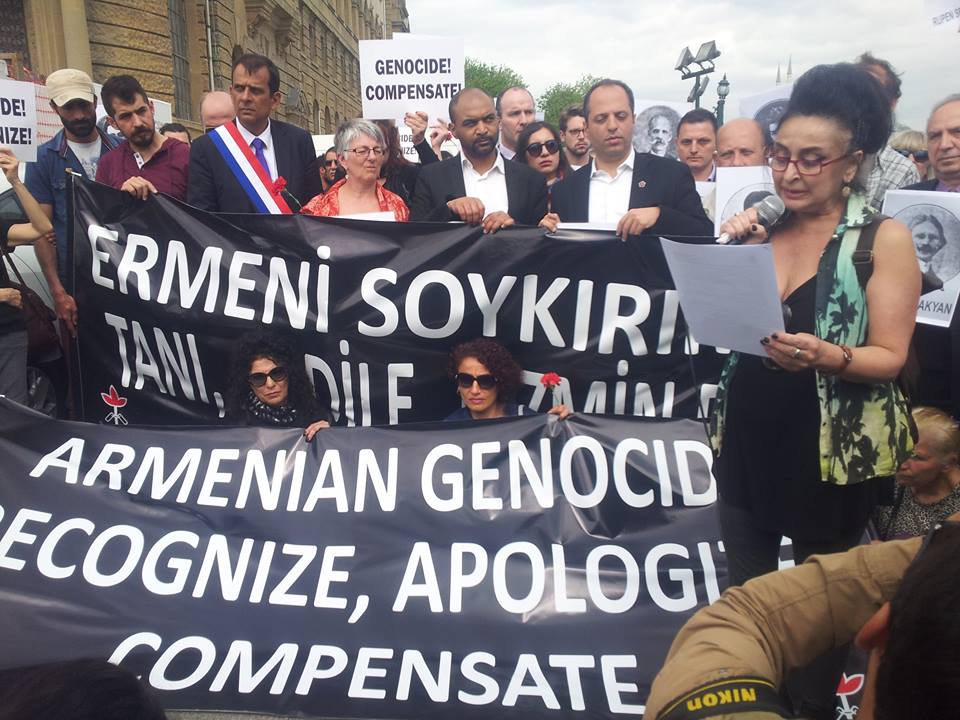Armenian Genocide Commemorated in Istanbul
April 24, 2016Turkey Rights Group: Denial Perpetuates Genocide
ISTANBUL, Turkey (A.W.)—The Armenian Genocide was commemorated today at Istanbul’s Hayderpasha train station. Participants held banners and photographs of the intellectuals arrested and killed in 1915, and posters demanding recognition and reparations for the Armenian Genocide.

The Armenian Genocide was commemorated today at Istanbul’s Hayderpasha train station. (Photo: Hrant Kasparyan)
In 1915, members of the Istanbul Armenian community, including intellectual and cultural leaders, were arrested in their homes, detained at the city’s central prison (now the Museum of Turkish and Islamic Arts in Sultanahmet Square), and then sent off to the Haydarpasha train station from where they were sent to the interior to their deaths.
The following statement by the Human Rights Association of Turkey Istanbul branch was read in Turkish, Armenian, and English at today’s commemoration.
***
The Genocide that Lasts
When a crime goes unpunished, it continues to be committed. Denial perpetuates genocide.
The Armenian Genocide is a crime against humanity that continues to be committed because it is denied and its perpetrators have gone unpunished.
One-hundred-and-one years ago today, people from all walks of life from the Armenian community, but especially leading intellectuals, poets, writers, and journalists, were shipped here to Haydarpasha from Sarayburnu before they were sent to their deaths in Anatolia. Very few survived; most were killed.
These arrests represent the beginning of the genocidal process realized by way of clear orders by the Committee of Union and Progress (CUP), the central government of the Ottoman Empire, as well as the effective organization of the provinces for the execution of these orders and the participation of the local inhabitants.
Before 1915, according to the census of the Istanbul Patriarchate, the Armenian population of the Empire was 2 million, and Armenians lived in 2,925 settlements comprising cities, districts, and villages. These communities had 1,996 schools, 173,000 male and female students, and 2,538 churches and monasteries. The Armenian social existence, which had been strikingly vibrant, was destroyed not only by outright massacres and exile, but also through the demolition of social infrastructure such as schools, libraries, churches, etc., as well as material dispossession. Their institutions, culture, history, and civilization, even the vestiges of their existence were subject to destruction.
The genocide of 1915 was also “SEYFO,” the mass massacre and exile of the Assyrian people. It was also the genocide of the Greeks of Asia Minor and Pontus.
If we have declared that genocide denial perpetuates genocide, it is because denial becomes institutionalized, and in fact socialized and internalized by generations of perpetrators. Denial continually reproduces hatred against the identity of the victims.
By going unpunished, this crime against humanity was perpetuated in Turkey through coups, the bloody suppression of the Kurdish insurrection, the Dersim genocide, the incineration and evisceration of villages in the 90’s, and the reduction of millions of people to refugees in their own country. The 1915 genocide and its denial—the assumption that the state can act outside the law and commit crimes whenever it wants—became entrenched in the system and in minds; it was naturalized, and normalized. It is by and large for this reason that coups, torture, forced disappearances, murders by unknown assailants came to be seen not as crimes but as necessary and mandatory executions of the state. Those who were responsible were protected by the mantle of impunity.
Today, this internalized state mentality has resulted in the war that the state has been waging since August 2015 against the Kurds with its army, with tanks and cannons; it is also at the root of the absence of strong mass resistance from the Turkish people to this war.
As we have said, genocide denial perpetuates genocide. Denial is the exculpation of the perpetrator and the criminalization of the victim. From course books to special publications, from newspapers to television programs, Armenians have been represented as those who deserve genocide. Since the foundation of the Republic, the Armenians of Turkey have been living to this day in a society that remains hostile to them and in close quarters with the grandchildren of perpetrators who think exactly the way their predecessors did.
Whenever the state feels threatened, the usual hostility against Armenians spikes up to horrific levels. Armenians are all the more threatened today under the circumstances of a thoroughly racist war perpetrated by the state against its own citizens, the Kurds, against the grain of all universal laws of war.
Genocide denial leads to the indoctrination of anti-Armenian nationalist generations, to a never-ending offense against the memory of the victims, and to the laceration of their descendants’ wounds. As descendants of perpetrators, we too are responsible for denial; we live with this profound shame.
There has been no end to blood, tears, and laments in Turkey since the genocide and its denial. This is because the crime has gone unpunished and in fact continued with new crimes whose perpetrators too have gone unpunished—because justice has not been established. The graveless dead of the genocide continue to suffer their torment.
We have always said and hereby repeat:
– As long as the genocide remains unrecognized,
– As long as an apology is not offered to the Armenians, Assyrians, and Greeks who have dispersed all over the world,
– As long as the confiscated cash and property remains uncompensated,
– As long as the war against the Kurds continues and the Kurds’ right to self-determination remains unrecognized,
– As long as an order in keeping with democracy, the rule of law, and human rights is not established,
justice will not be established. The curse of the genocide will not be lifted, and these regions will never see the light of day. This is not a prediction, but a statement of fact.
RECOGNIZE THE GENOCIDE WITH ALL ITS LEGAL IMPLICATIONS! ESTABLISH JUSTICE!
Human Rights Association, Istanbul Branch
Source: Armenian Weekly
Link: Armenian Genocide Commemorated in Istanbul